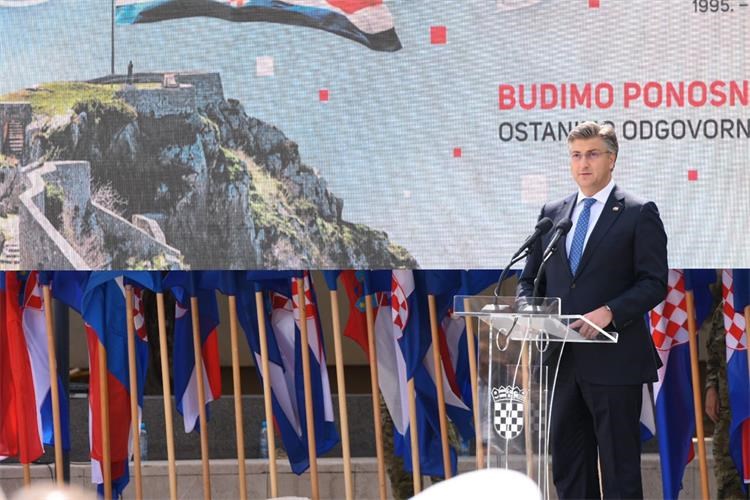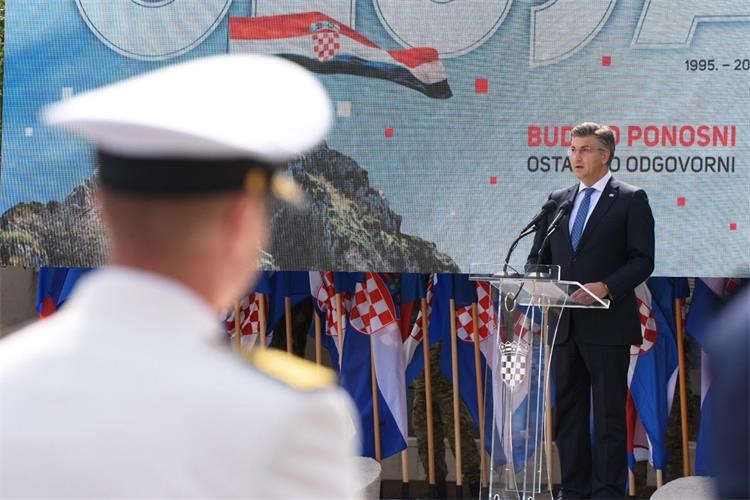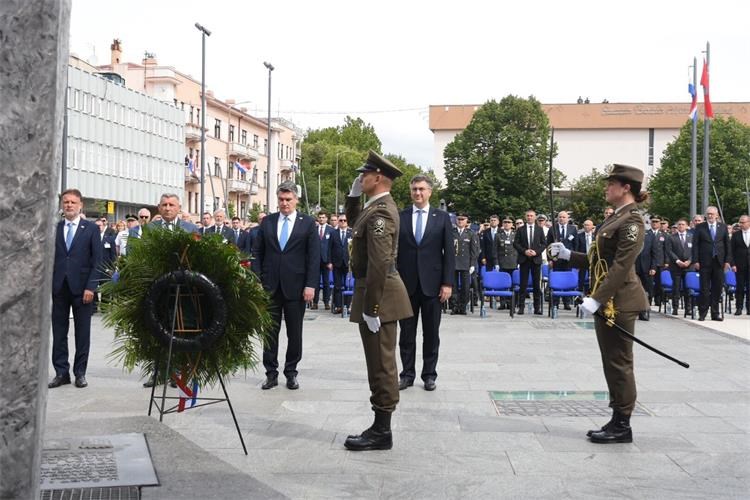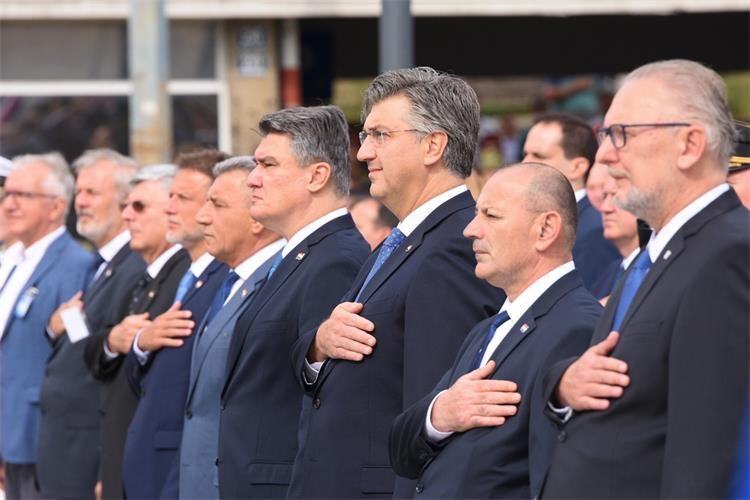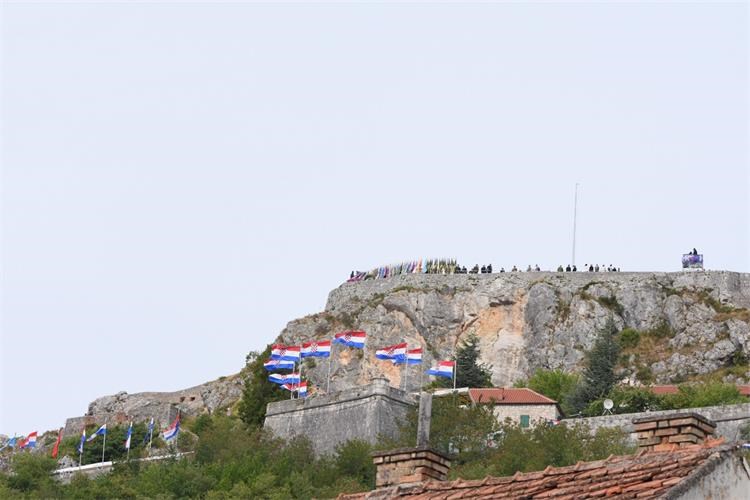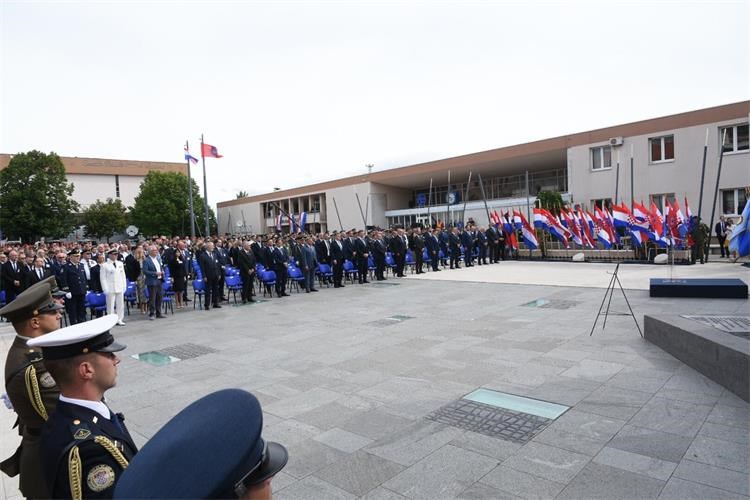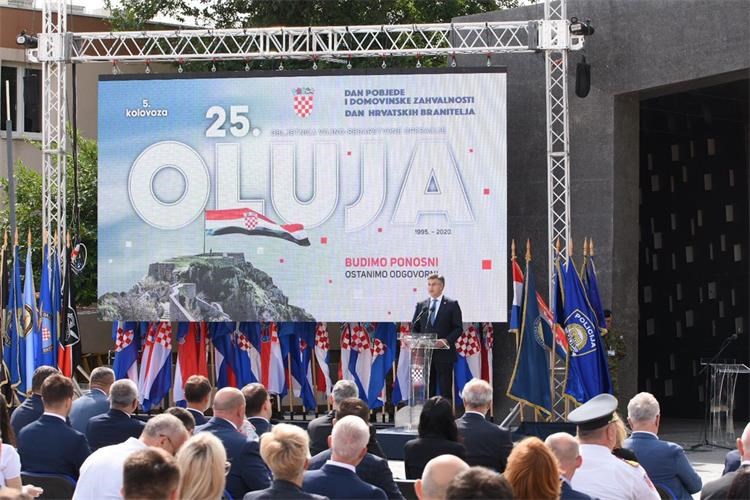- Published: 05.08.2020.
We mark this day as a day of victory, gratitude and pride, with a sense of reconciliation and respect
Speech by Prime Minister Plenković on the occasion of the celebration of the Day of Victory and Homeland Gratitude, the Day of Croatian War Veterans and the 25th anniversary of the Military-Police Operation “Storm”.
Dear Mr. President of the Republic,
Dear Mr. Speaker of the Croatian Parliament,
Dear General Gotovina,
Dear Members of the Croatian Government,
Distinguished Members of the Croatian Parliament,
Chief of the General Staff of the Armed Forces,
Director of Police,
Father Bishop,
Dear Mr. Prefect of the Šibenik-Knin County,
Dear Mayor of Knin,
Dear Croatian war veterans and disabled war veterans,
Respected families of killed, deceased and missing Croatian war veterans,
Dear citizens of Knin,
Dear Croats,
Dear fellow citizens in Croatia and abroad,
I congratulate everyone today’s Day of Victory and Homeland Gratitude, as well as the Day of Croatian War Veterans, both of which we mark on the 25th anniversary of the Military-Police Operation “Storm”.
We mark this day as a day of victory, gratitude and pride, with a sense of reconciliation and respect, as foundations of Croatia’s future.
Knin
It is always a special feeling to speak from the ancient city of Knin, the cradle of Croatian statehood, from the city of Zvonimir, a city that used to be the capital of the Croatian Kingdom, from the city in which the duke (herceg) and the viceroy (ban) ruled in turn in the late Middle Ages; from the city in which the assemblies of Dalmatia and Croatia were held, city that was home to the Viceroy’s Court, city ruled by the nobles of Bribirski and Nelipići, and today, a city that symbolizes Croatian freedom, Croatian victory in the Homeland War.
And this victory is best symbolized by the image of the first Croatian President, Dr. Franjo Tuđman, who – the day after the liberation of Knin – kisses the Croatian tricolor on the Knin Fortress.
This historic moment, which then caused admiration and tears of joy throughout Croatia, still brings up strong emotions in all of us. It fills us with a sense of pride and deep gratitude because it meant that the war was over and that hundreds of thousands of refugees would be able to return to their homes.
Victory
None of this would have been possible without victory.
After a five-year occupation of Croatian territory, in “Storm” we achieved military victory. We defeated Slobodan Milošević’s politics of Greater Serbia and ensured Croatia’s continued existence.
In less than four days, almost a fifth of Croatian territory was liberated, from which 250,000 of our fellow citizens had been expelled.
Conditions were created for peaceful reintegration of the Croatian Danube Region. When that process ended in 1998, the integrity of Croatian territory was achieved in full.
At the same time, “Storm” broke the siege of the city of Bihać in Bosnia and Herzegovina, in which 170,000 people lived for three years, under threat of experiencing the same fate as Srebrenica.
“Storm” strategically changed the balance of power, and later made it possible that large parts of Bosnia and Herzegovina are liberated, together with the Army of Bosnia and Herzegovina and the Croatian Defense Council.
All this eventually led to the Dayton-Paris Peace Agreement, which marked the end of the war.
With more than 20,000 people killed and 15% of the housing stock destroyed, Croatia suffered enormous war damage and lost 15 years of development opportunities.
Because of all this, “Storm” – which took place in its entirety on the territory of Croatia – was a legally legitimate, militarily inevitable and a politically necessary action. Its conduct was also imperative for the then Croatian leadership so as to enable the return of refugees and reconnect the cut off parts of the country.
Apart from being the culmination of all efforts aimed at defending and liberating Croatia, “Storm” was a turning point in achieving peace and stability in Southeast Europe. This is why we can rightly consider Operation “Storm” our greatest victory.
Gratitude
Another strong feeling that overwhelms us is gratitude.
First and foremost, towards the Croatian defenders, as a permanent obligation of all of us who are today the heirs of the freedom that our war veterans fought for and achieved.
And, in order to protect their dignity and improve their status, we passed the Law on Croatian Homeland War Veterans and Members of Their Families.
It is also our duty to continue to tirelessly search for 1,869 still missing Croatian citizens. For this reason, we also passed a special law on missing persons from the Homeland War.
In order to regulate in a humane and civilized way the numerous painful issues that burden our society, we will also pass a special law on civilian victims of the Homeland War.
Pride
The third feeling that today’s day evokes in us is pride.
Remembering those days of pride and glory, we have in mind the courage, determination, accord and strength that the Croatian people showed at that point in history.
Pride because we know that in those days we acted united and with joint effort of all Croatian people, we defended Croatia and achieved what generations of Croats dreamed of – a free Croatia!
Therefore, Croatia, like all countries in the world, proudly celebrates days in which national unity, national identity and Croatian statehood were strengthened.
And for these reasons, and so that our young people learn to appreciate the freedom we have today, to be aware of the sacrifices made for our freedom, to build an inclusive and modern society with pride and optimism, and to cultivate patriotic values, in the past three years we enabled more than 130,000 children to visit Vukovar, Knin and other historically important and symbolic places of the Homeland War.
We want our young people to be proud of our hitherto achievements and to develop Croatia in the future as a country of self-conscious people, who appreciate national values.
Because respecting the other begins with self-esteem.
Reconciliation
Ladies and gentlemen,
“A winner who does not know how to forgive sows the seeds of new divisions and future evils, and the Croatian people do not want that.”
This was a strong message of reconciliation from President Franjo Tuđman. A message that already in June 1997 he sent to the future Croatian returnees and the local Serb population in Vukovar.
Even today, we hear the sounds of these statesmanlike messages. We must keep them in mind as we build an inclusive and tolerant future-oriented Croatia.
As a country that won the war that was imposed upon us, with many innocent civilian victims, we mourn all victims, especially civilians, and not only Croats, but also Serbs and all other nationalities.
We remember with sadness and reverence the hundreds of thousands of refugees expelled from their homes and all those who died defending Croatia from 1991 until the end of the Homeland War.
We also remember all the civilian victims and among them the numerous victims of war crimes committed throughout Croatia in the name of the ideology of Greater Serbia. Many of these war crimes are still unpunished.
We mourn especially the victims of war crimes committed by those on the Croatian side, which unfortunately also happened. A legitimate right to defend oneself is not and cannot be an excuse for a crime. Each and any such act is painful for victims’ families and an ugly scar on the just face and defense nature of the Homeland War.
We are also aware that our victory in “Storm” was traumatic for many Croatian Serbs, who primarily associate it with the departure of part of the Serb population from their homes and homelands in the previously occupied areas.
While most Croats see it as forced refuge organized and ordered by the Knin rebels, many Serbs see it as refuge from Croatian forces.
Today, 25 years later, it is time for us to take a composed account of the complexity of events at that time.
The fact is that after “Storm”, the Croatian state made great efforts to ensure the return of those Croatian Serbs who wanted to return to their homeland and that much has already been done.
But it is also true that there are still difficulties that need to be overcome in order for them to feel equal in every way, in order to have all the conditions for a life worthy of the 21st century.
We also know that many Croatian Serbs in the non-occupied areas of Croatia during the war shared the fate of their Croatian fellow citizens, and many also served in the Croatian Army, which we should also be proud of.
It is also important that Croatian Serbs see “Storm” not as exodus of their people, but as an event that marked the end of the war and created conditions for their return to Croatia, for all those who want or will want to do so.
Respect
In the end, due respect should be shown to every innocent victim, whether they are of Croatian, Serbian or another nationality.
Respect and piety towards thousands of innocent Croatian victims from Vukovar to Dubrovnik, including Voćin, Saborsko and Škabrnja.
Respect and piety for innocent Serbian victims from Paulin Dvor to Varivode, without calling into question the legitimacy or the just nature of the Homeland War or diminishing the victory achieved in “Storm”.
On the contrary, with our respect for the victims, we show generosity and humanity of a victor who, in spite of everything, regrets each mistake or crime that was not prevented.
We expect the same from all segments of Croatian society, especially from the representatives of Serbs in Croatia, who should also clearly condemn all crimes committed against Croats.
Let us all have the courage and humanity to show equal reverence for the innocent victims of other nations.
Croatia – as a state and as a society – needs to move forward.
Sincere reconciliation can only be built on truth, grounded in facts, on cooperation with everyone in finding the still missing people, and on justice for all the victims.
And therefore, regardless of the nationality of the victim or the perpetrator, all those crimes that do not become statute-barred will continue to be prosecuted.
Future challenges
Ladies and gentlemen,
Croatia was attacked, defended and won freedom.
As the victor, Croatia extended its hand of reconciliation and is now building its future.
Today – when the world is dealing with the greatest health threat in the last hundred years and the most severe economic crisis since World War II – we must once again strengthen national unity around Croatia’s strategic goals.
Therefore, let us draw inspiration from the courage and sacrifice of Croatian defenders to be able to successfully deal with the great challenges that lie ahead!
Once again, I wish everyone a happy Victory and Homeland Gratitude Day and Croatian War Veterans Day!
